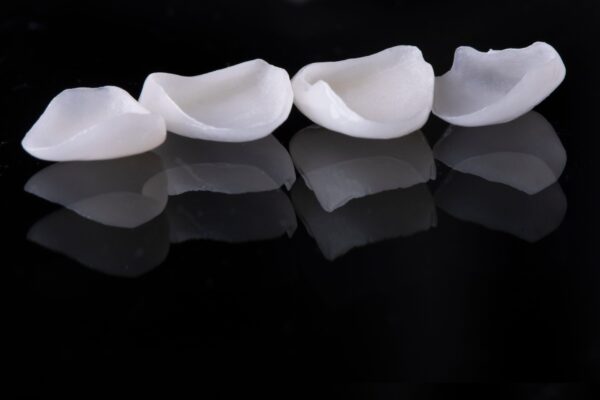There are a number of treatments that may be available for an individual with issues concerning their dental aesthetics. One of the best treatments possible for eligible patients is porcelain veneers in London.
If you are not fully aware of porcelain veneers and their versatility, you may be under the impression that there needs to be extensive, invasive dental work on your natural teeth before you can receive veneers. This type of treatment is common for dental tourism and Turkey Teeth and renders the natural teeth completely unusable in their new state.
In reality, for the vast majority of patients, this type of dental treatment is not required. However, there will need to be some form of shaving of the enamel in order to make room for the porcelain veneer material.
So, do veneers ruin your teeth? In this blog post we’ll answer that question, along with many more that relate to tooth damage and veneers that we frequently hear.
Are veneers bad for your teeth?
As long as porcelain veneers are properly fitted, they are not bad for your teeth.
They are intended to be a permanent supplementation to your natural teeth – provided that you get the veneers replaced when they reach the end of their lifespan. This means that they improve the aesthetics of your teeth from the outside without damaging the nerve of the tooth so that it remains healthy on the inside.
There is the potential for some damage to occur if the veneers are not fitted securely. If this is the case, then food or drink can become stuck underneath the veneer material where it cannot be cleaned. This will lead to tooth decay or a build-up of bacteria which can be harmful and, if left unchecked, could lead to tooth loss.


Does getting veneers hurt?
No, the entire process of having veneers fitted does not hurt. Patients are under local anaesthetic which means that they do not feel any pain during the preparation period.
Some people report feeling a throbbing pain after veneers which stems from sensitivity. Because enamel is shaved from your teeth, it can briefly heighten tooth sensitivity for a period after veneers are applied. This should subside within a week or two of your appointment, if it does not then you should inform your treatment provider.
What do teeth under veneers look like?
Depending on the case, teeth under veneers can look just like normal, natural teeth. Or, they may look just like natural teeth but smaller and with larger gaps between each tooth.
Filed-down teeth before veneers are not as extreme as the dental tourism cases will lead you to believe. For example, here is an example of one of our patients that compares their natural teeth with their prepared teeth before their veneers were applied.




It is worth noting that the discolouration of the gumline in this picture is a result of having to contour the gum line with a laser. The texture and colour of the gum returns to normal within just a few days.
How long do teeth veneers last?
Our porcelain veneers last for between 10 and 15 years. Although the latest peer-reviewed research shows that porcelain veneers are capable of lasting up to as long as 20 years.
Of course, this is dependent on how well maintained the veneers are over their lifespan. Patients should care for their veneers as they would their natural teeth. This includes visiting a cosmetic dentist twice a year, regularly brushing and flossing teeth, and being careful with anything that may stain the teeth such as coffee, red wine, and smoking.
At Marylebone Smile Clinic, we provide a 7-year guarantee for our porcelain veneer customers after we review their teeth at a follow-up consultation.
Can veneers be removed?
Veneers themselves can be removed, but you cannot return to your natural teeth after they have been prepped for veneers.
Because veneers have a finite lifespan, there will come a point where they will have to be removed so that they can be replaced. Veneers can fall off also, although this is rare and would likely be a sign that either the veneer was not applied to a high enough standard or you were not caring for your veneers appropriately.
Your teeth after your veneers are removed would look aesthetically poor, and they would be functionally poor as well. The surface and perimeter of the tooth would be rough where the enamel has been worn down to make space to bond the veneer, and there would be a chance that your teeth will be sensitive because the dentine layer is closer to being exposed.
On top of sensitivity, teeth would be more at risk of decay or damage because there would be less enamel to act as a protective barrier.
Are veneers worth it?
If you are unhappy with your dental aesthetics and are ready to make a change, then porcelain veneers are definitely worth it.
They are long-lasting, durable, and their aesthetics are second to none. Consider getting in touch with our team at Marylebone Smile Clinic and we can perform a free online assessment of your teeth to see whether you would be eligible for veneers.
Want to know more?
Get in touch to enquire about our services or to book an appointment.